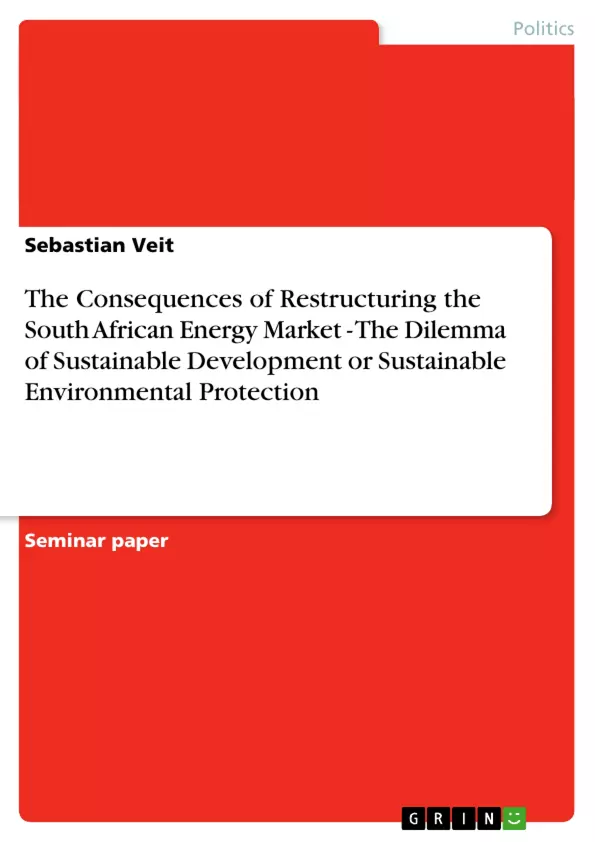Energy is a key issue for the African continent due to the higher consumption of power in the developing countries. Rapid growth in the economies of developing countries in recent years has led to an increase in incomes which is reflected in higher living standards. This goes hand in hand with an increase in consumption of electricity, petrol, coal, natural gas and other fuels.
The dilemma of maintaining competitive energy prices in order to encourage economic growth on one hand, and on the other hand of generating energy in an environmentally friendly way is a global concern. This dilemma plays a key role in South
Africa especially.1The major energy producer, ESKOM Holdings, privatized 30% of its generating capacety in 2002 and is now caught in the triangle of providing its customers cheap electricity, in an environmentally responsible way and at the same time creating profits for its investors as well as the government. The above mentioned three interests are often in conflic with each other.
The aim of this research paper is to investigate how ESKOM will address pressing issues of satisfying the described conflicts. First, I will give a general introduction into the particularities of the energy sector, which is followed by a brief description of ESKOM. This includes an overview how electricity is currently generated in South Africa. Additionally I will critically assess ESKOM’s research projects. In the second part, I will give examples for environmentally sustainable energy production. In the concluding part I will give my outlook as to how the triangle of conflicts can possibly be addressed.
Right at the onset I would like to pint out that a further assessment on the effects of ESKOMs additional stake holders cannot be undertaken in this paper, since this should be addressed with the focus on private households which probably have to face higher energy costs due to an increase of profitability demands. As the Business Day analyzes regarding the para statal ownership dilemma: “It has become apparent since Alee Erwin was appointed Public Enterprises Minister in April that the state's biggest assets are in crisis….The issue of whether state-owned entities are privatized or not is really irrelevant. But those which operate in a business environment need to operate as tough, smart businesses.”
Inhaltsverzeichnis (Table of Contents)
- Introduction
- The Particularities of Energy Producers
- Company Profile of ESKOM
- Facts of Generating Electricity in South Africa
- ESKOM's Research and Development
- The Nation State and Energy Production
- Further Observations and Suggestions
- Conclusions
- References
Zielsetzung und Themenschwerpunkte (Objectives and Key Themes)
This research paper aims to explore how ESKOM will address the conflict between maintaining competitive energy prices to encourage economic growth and generating energy in an environmentally friendly way. The paper will analyze ESKOM's strategies and research projects, examine sustainable energy production methods, and provide an outlook on how the conflicting interests can be balanced.
- The dilemma of balancing economic growth with environmental sustainability in the energy sector.
- The role of ESKOM as the major energy producer in South Africa.
- The particularities of energy producers, including the difficulty of storing or improving the quality of the product.
- The inverse relationship between electricity consumption and macroeconomic indicators.
- The impact of energy prices on the economy and industry.
Zusammenfassung der Kapitel (Chapter Summaries)
- Introduction: This chapter introduces the global dilemma of balancing economic growth with environmental sustainability in the energy sector, particularly in developing countries. It highlights the case of ESKOM, the major energy producer in South Africa, and its challenges in addressing this conflict.
- The Particularities of Energy Producers: This chapter examines the specific characteristics of the energy sector, distinguishing it from other industries. It focuses on the unique challenges of energy producers, such as the difficulty of storing or improving the product, the lack of marketing opportunities, and the inverse relationship between electricity consumption and economic growth.
- Company Profile of ESKOM: This chapter provides a brief overview of ESKOM, including its role in generating electricity in South Africa. It highlights ESKOM's recent privatization and its current challenges in balancing profitability, environmental responsibility, and affordable energy prices for customers.
- Facts of Generating Electricity in South Africa: This section details the current methods of generating electricity in South Africa, focusing on the significant reliance on coal and its associated environmental impacts.
- ESKOM's Research and Development: This section critically assesses ESKOM's research projects aimed at addressing the challenges of sustainable energy production.
Schlüsselwörter (Keywords)
The key focus topics of this research paper include the South African energy market, ESKOM, sustainable development, environmental protection, energy pricing, economic growth, privatization, and research and development in the energy sector.
Frequently Asked Questions
What is the central dilemma facing the South African energy sector?
The main conflict lies in balancing competitive energy prices to encourage economic growth with the need to generate energy in an environmentally friendly and sustainable way.
Who is ESKOM and what is its role in South Africa?
ESKOM Holdings is the major energy producer in South Africa. Since privatizing 30% of its capacity in 2002, it must balance affordable electricity, environmental responsibility, and investor profitability.
How is electricity primarily generated in South Africa?
South Africa relies heavily on coal for electricity generation, which presents significant environmental challenges that ESKOM's research projects aim to address.
What are the unique characteristics of energy producers mentioned in the paper?
Energy production is unique because the product is difficult to store, quality is hard to improve after generation, and there is often an inverse relationship between consumption and economic growth.
What is the objective of ESKOM's research and development?
ESKOM's R&D focuses on finding sustainable energy production methods that can satisfy conflicting interests within the South African market.
- Quote paper
- M.A. Sebastian Veit (Author), 2004, The Consequences of Restructuring the South African Energy Market - The Dilemma of Sustainable Development or Sustainable Environmental Protection, Munich, GRIN Verlag, https://www.grin.com/document/69272



